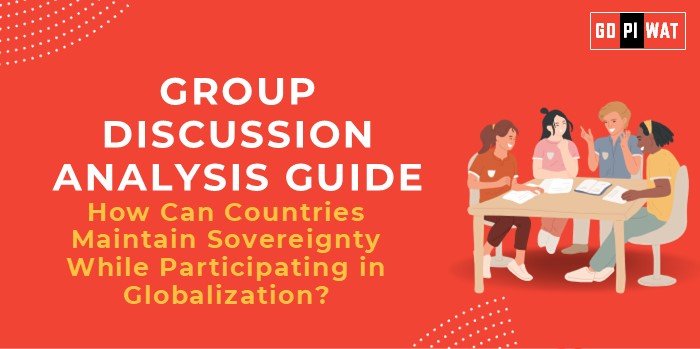📋 Group Discussion (GD) Analysis Guide
🌟 How Can Countries Maintain Sovereignty While Participating in Globalization?
🌐 Introduction to the Topic
Opening Context: Globalization has interconnected economies and societies, fostering trade, technology exchange, and cultural diffusion. However, this interdependence poses challenges to national sovereignty.
Topic Background: As globalization accelerates, balancing international collaboration with domestic autonomy has become a central debate. Recent events, such as trade wars, the rise of protectionism, and international agreements like the Paris Climate Accord, highlight the complexities of sovereignty in a globalized world.
📊 Quick Facts and Key Statistics
- 🌍 Global Trade Value: $32 trillion (2022) – Reflects the scale of global interconnectivity.
- 💻 Internet Penetration: 5.3 billion users worldwide – Shows the digital fabric of globalization.
- 💸 Tariff Wars: $550 billion in tariffs during the U.S.-China trade war – Underscores sovereignty tensions.
- 🏢 Multinational Influence: 69 of the top 100 economies are corporations – Highlights challenges to policy control.
👥 Stakeholders and Their Roles
- 🏛️ National Governments: Create policies to protect sovereignty while engaging internationally.
- 🏢 Multinational Corporations (MNCs): Influence regulations and economic landscapes globally.
- 🌐 International Organizations: Facilitate cooperation while respecting member states’ autonomy (e.g., WTO, UN).
- 🤝 Civil Society: Advocates for balancing global benefits with local interests.
- 👥 Citizens: Experience the direct impact of globalization on culture, economy, and identity.
🏆 Achievements and Challenges
- 🎯 Achievements:
- Economic Growth: Globalization has increased GDP globally, reducing poverty in nations like China and India.
- Cultural Exchange: Diverse cultures coexist and interact, enriching societies.
- Technological Advancements: Cross-border collaboration fosters innovation, such as COVID-19 vaccine development.
- ⚠️ Challenges:
- Policy Independence: MNCs often pressure governments for favorable conditions.
- Trade-offs in Agreements: International treaties may restrict national policy-making.
- Economic Inequality: Benefits of globalization are not evenly distributed.
- Cultural Erosion: Local traditions sometimes yield to global cultural dominance.
🌍 Global Comparisons
- 🌟 Success: Switzerland balances globalization with neutrality and a strong local economy.
- 🌍 Challenges: Developing nations face difficulty resisting MNCs due to financial dependence.
Case Study:
- 🇮🇳 India’s Aatmanirbhar Bharat (Self-Reliant India): Aims to integrate globally while building domestic resilience.
📋 Structured Arguments for Discussion
- ✔️ Supporting Stance: “Globalization offers unparalleled economic growth opportunities, but sovereignty can be safeguarded through strong domestic policies.”
- ❌ Opposing Stance: “Globalization inherently compromises sovereignty, as international bodies and MNCs dominate national decision-making.”
- ⚖️ Balanced Perspective: “Sovereignty and globalization can coexist if nations adopt strategic policies that emphasize autonomy while engaging globally.”
🛠️ Effective Discussion Approaches
- 🔍 Opening Approaches:
- Statistical Insight: “With $32 trillion in global trade, globalization’s scale underscores its duality as a boon and a challenge for sovereignty.”
- Historical Context: “Post-WWII globalization highlights a complex relationship between economic growth and policy independence.”
- Example-Based: “India’s balancing act with Make in India demonstrates sovereignty maintenance in a globalized world.”
- 💬 Counter-Argument Handling:
- Acknowledge: “Globalization does pose sovereignty risks.”
- Rebut: “However, policy measures like tariff controls or localized production can mitigate these risks.”
📈 Strategic Analysis of Strengths and Weaknesses
- 🟢 Strengths:
- Access to global markets.
- International cooperation.
- Cultural enrichment.
- 🟡 Weaknesses:
- Erosion of traditional industries.
- Policy dependency on global institutions.
- 🔵 Opportunities:
- Technological collaborations.
- Trade diversification.
- 🔴 Threats:
- Overreliance on foreign markets.
- Cultural homogenization.
📚 Connecting with B-School Applications
- 🌏 Real-World Applications: Topics like trade policies, corporate strategies, and global market analysis.
- 🤔 Sample Interview Questions:
- “How can countries ensure fair trade while maintaining sovereignty?”
- “Evaluate the role of globalization in advancing innovation at the cost of sovereignty.”
- 💡 Insights for Students:
- Explore the impact of globalization on business, governance, and societal resilience.


